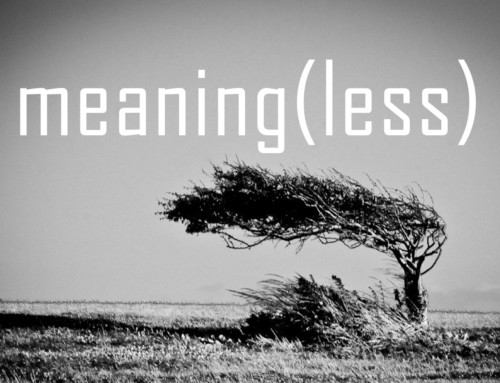I went to a funeral recently where the officiating pastor quoted this verse from Ecclesiastes 7:4: “A wise person thinks much about death, while the fool thinks only about having a good time now” (NLT). It was a good word, and not surprisingly, it got me thinking. The following represents the fruit of some of my sustained “thinking” time on the subject of death.
- Death is not natural (Gen. 2:17; Rev. 21:4). Just because it happens to all of us does not mean that we should accept it as a natural part of life. It is not. It is an unwelcome intruder. It is a distortion of the way things are supposed to be. It was not part of God’s original creation, and it will not be part of His renewed creation.
- Death entered the world through sin (Rom. 5:12). God warned Adam that if he ate of the tree of the knowledge of good and evil, he would surely die. But Adam disobeyed God anyways and, as a result, death entered the world. As our representative, his rebellion meant death for all of mankind.
- Death comes to everyone (Eccl. 7:2; Ps. 89:48; Heb. 9:27). This is common knowledge and has already been stated. But it bears repeating. Every person who lives will face death. We are all going to die at some point. It is common to our human experience.
- Death is the wages of sin (Rom. 6:23). Death proves that we are sinners in need of grace. Just as we work and earn money, so we sin and earn death. At birth, we all inherit a sinful human nature that is wholly corrupt and bent toward sin. Therefore, we are sinners and death is what our sin deserves.
- Death is an enemy (1 Cor. 15:26). We should not speak kindly of death, or shrug it off as normal, or worse, joke about it. Death is our enemy. It’s an adversary that stands in the way of God’s original intentions for human life and his blessing. Satan tries to use death to scare us, but the reality is that, in Christ, it is a disarmed enemy and has no power over us. This is true to the point that Paul can say that “to die is gain” because through death he goes to be with Christ forever.
- God is sovereign over death (1 Sam. 2:6; Matt. 10:29; Eph. 1:11). Nothing happens apart from the perfect will of God, even death. This includes heart attacks, car accidents, medical malpractice, natural disasters, etc. Death cannot defeat his purposes or frustrate his plans. We may not understand how this is so, but it is so nonetheless.
- The day of our death has already been determined (Ps. 139:16). We will all die on the exact day that God has determined for us, not a minute sooner and not a minute later. It is true that God does sometimes grant us more time (see King Hezekiah), but even this is ultimately part of his plan. His will is always done.
- God takes no pleasure in the death of the wicked (Ezek. 18:32). It is God’s expressly revealed will that all would acknowledge their sin, repent, and turn to him and be saved. While his justice is served in the death of his enemies, his pleasure is found only in the salvation of his saints.
- Death is sad (John 11:35; 1 Thess. 4:13). It separates us from our loved ones. It’s a reminder of our sinful condition. Death is a time to grieve. We shouldn’t pretend that it’s no big deal just because we’re Christians. We don’t grieve as those who have no hope, but we do still grieve.
- Jesus did not want to experience death (Matt. 26:39). Even our Savior, being fully human as well as fully God, thought the prospect of dying on a cross, albeit for the sins of the world, was something he would rather avoid, if it were possible. Aversion to death is normal to the human experience.
- Jesus’ death paid for our sins and reconciles us to God (Rom. 5:10; 6:10). His death satisfied the wrath of God against our sins forever. He suffered in our place. He died our death and gives us his righteousness in order to reconcile us to God. The fear of death has to do with facing God in our sin, but in Jesus, we no longer stand condemned.
- Jesus has conquered death (2 Tim. 1:10; 1 Cor. 15:56-57; Rev. 1:8). The grave could not hold him. He has risen and he reigns and he lives to intercede for his people. Therefore, he is able to save us to the uttermost. Death is our enemy and we must face it, but it is a defeated enemy. In Christ, it’s like a bee without a stinger. If we know Jesus and belong to him, we know the one who has authority over death.
- Death cannot separate us from the love of God in Christ (Rom. 8:38). God’s love for us is not tied to this physical reality. It transcends it, and nothing can sever us from it, not even death. In Christ, we have eternal fellowship with God. Death cannot break that relationship because death is not the most powerful force in the universe, God is.
- Believers who die go directly into the presence of Jesus (Phil 1:23; 2 Cor. 5:8). Though our bodies may die, our souls (or spirits) continue in a conscious existence. And the testimony of Scripture is that, for believers, to be absent from the body is to be present with the Lord. Wherever Jesus is, that’s where we will be.
- Death is sleep for the Christian’s body (1 Thess. 4:13). Paul speaks of believers who have died as those who have fallen asleep. Their bodies rest in the grave while their souls (or spirits) are present with Jesus. The Greek word for “cemetery” literally means “sleeping place.” The implication is that one day our bodies will “wake up.”
- Jesus will raise our bodies from the dead (1 Cor. 15:51-52; 1 Thess. 4:16). One day, when Jesus returns, he will cause our bodies to rise from the dead and our souls (or spirits) will be reunited with our bodies. But these bodies will be transformed into new glorified bodies that will never die again, nor will they be able to. They will be uniquely fitted for the new heavens and the new earth. And we will forever live with Christ there.
- Death should motivate us to live for Christ (2 Cor. 5:10). Every person who ever lives will stand before the judgment seat of Christ. For believers, saved by Christ, that judgment will consist only of rewards for work accomplished. For unbelievers, it will also be a judgment of works, but only of sinful deeds deserving of wrath and punishment. Both realities should motivate us as believers to be about the work of sharing the good news that God has provided a Savior in the person and work of Jesus Christ.
- Fear of death reveals a lack of faith in God and his promises (Matt. 10:28; 2 Tim. 1:7). When we fear death, it usually signals that something is amiss in our relationship with God. For the unbeliever, it’s simple; he must be reconciled to God through faith in Christ. But for the believer, it usually means that we’re not thinking rightly about God or his promises or his gospel. Either way, we need to cry out like the man in Mark 9:24, “I believe, help my unbelief!” Weak faith is enough to save as long as it clings to Christ.
- Death will not exist in the renewed creation (Rev. 21:8). When God makes all things new, heaven and earth will be joined and we will live there with God forever in new glorified bodies. It will be something like a return to the Garden of Eden, but better. Death will be no more. Life will finally be enjoyed in fellowship with God and man in the way in which it was originally intended.
- Death is the path to life (John 12:24-25). This world is passing away. It is not our home. Those who choose to cling to this world will lose their life forever, but those who give their lives to Christ, trust him, and are willing to die with him will gain their lives forever. By faith, we walk through the door of death and gain Christ on the other side.
The bottom line is this: Jesus is the answer to the death problem. He says, in John 11:25, “I am the resurrection and the life. Whoever believes in me, though he dies, yet shall he live, and everyone who lives and believes in me shall never die. Do you believe this?” What an encouragement to know that the one who said these words is the one who died on a cross for our sins, rose three days, and now lives forever as our Savior and Lord. He has conquered death and cancelled our condemnation and he is coming back soon. Amen. Come quickly, Lord Jesus!


